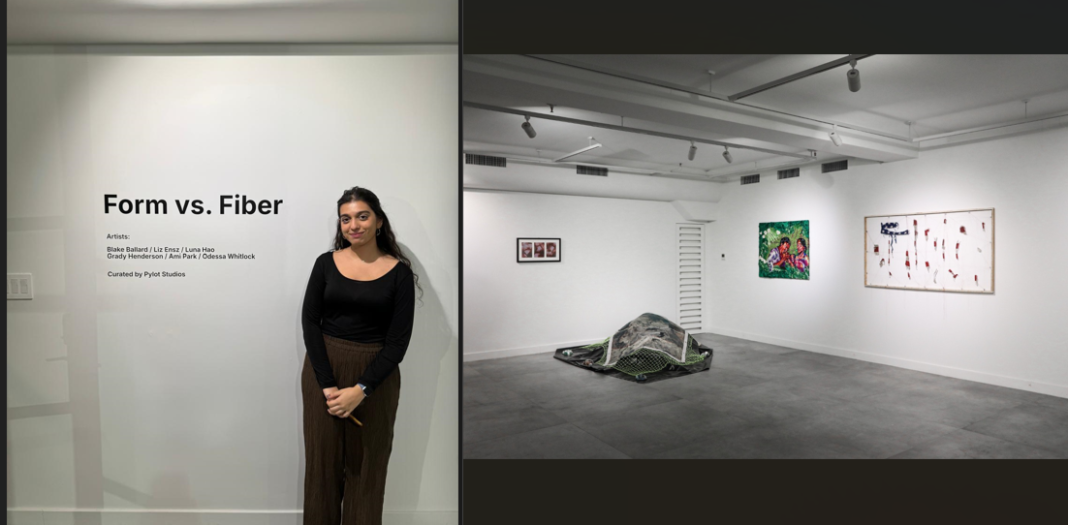Leia Tyebjee, a dynamic, emerging force in the contemporary art scene, is renowned for her innovative approach as an artist and curator. As the co-founder of Pylot Studios, based in the USA, Leia has carved out a unique niche that blends artistic integrity with entrepreneurial spirit. Her impressive background includes working at Gagosian and David Zwirner, where she gained invaluable insights into the workings of the art world at its highest level. With a diverse academic foundation in theatre, visual arts, and economics, Leia integrates storytelling, creativity, and practical management into her curatorial practice. Her commitment to fostering emerging artistic voices and creating inclusive platforms has significantly contributed to the global art ecosystem. Through Pylot Studios, she aims to bridge cultural gaps and facilitate meaningful dialogues within the art community, showcasing works that resonate locally and internationally. In a candid conversation, she gives insights about Pylot Studios.
Excerpts from the interview:
Having worked with renowned galleries like Gagosian and David Zwirner, how did those experiences influence your approach to Pylot Studios and its exhibitions?
My time at Gagosian and David Zwirner was transformative. It gave me firsthand insight into how the art world operates at the highest level, from curation to artist relationships. These experiences taught me the importance of artistic integrity and logistical precision. At Pylot Studios, I aim to blend those lessons—supporting artists’ creative visions while ensuring our exhibitions are professionally curated and executed.
How has your diverse academic background in theatre, visual arts, and economics shaped your perspective on managing an arts platform like Pylot Studios?
My education was instrumental in shaping a multidisciplinary approach to the arts. Theatre taught me storytelling, visual arts nurtured my creativity, and my Master’s in Arts Administration from Columbia University gave me a practical understanding of management and sustainability. These elements allow me to see Pylot Studios as an artistic and entrepreneurial endeavor, balancing creative freedom and operational efficiency.
What challenges have you encountered while curating exhibitions that merge traditional and contemporary techniques, and how do you address them?
One of the biggest challenges is striking the right balance between honoring tradition and embracing innovation. Artists often come with unique perspectives that require thoughtful integration into a cohesive narrative. We address these challenges by maintaining an open dialogue with artists and our audience, ensuring that the final exhibition resonates while staying true to the artists’ intentions.
How do you see Pylot Studios evolving in the next five years, and what impact do you aim to make in the global art ecosystem?
In the next five years, I envision Pylot Studios expanding its reach, collaborating with more international artists, and experimenting with new formats, including digital exhibitions. We aim to create a sustainable model supporting artistic growth while contributing to global conversations about art and culture.
With your expertise in arts management and curation, what advice would you give emerging artists looking to navigate today’s complex art world?
With my arts management and curation expertise, I offer valuable advice to emerging artists looking to navigate today’s complex art world. The art world can be overwhelming, but finding platforms that align with the artists’ values and vision is key. Networking, learning from others, and seeking mentorship can help them navigate this complexity effectively.
What unique perspective do you believe being a Mumbai native and studying in New York brings to your approach to art and curation?
My roots in Mumbai and my academic journey in New York have given me a dual lens through which to view the art world. Mumbai instilled a deep appreciation for cultural richness, while New York exposed me to global trends and practices. This blend allows me to create locally grounded and globally relevant exhibitions, enriching the art world with a unique perspective.
How do you ensure that Pylot Studios remains a platform that genuinely supports artists beyond just showcasing their work?
Pylot Studios and I are committed to fostering lasting relationships with the artists. Beyond exhibitions, we help artists connect with curators, gallerists, and other stakeholders. By providing resources, feedback, and visibility, they strive to be partners in the artists’ artistic journey, not just one-time collaborators.
What advice would you give aspiring arts administrators or curators who want to start their platform in the art world?
Start with a clear vision and be prepared for challenges. Building a platform requires patience, adaptability, and a genuine passion for art. Surround yourself with a supportive network and be open to collaborations. Most importantly, never lose sight of why you started—your passion will drive your success.




